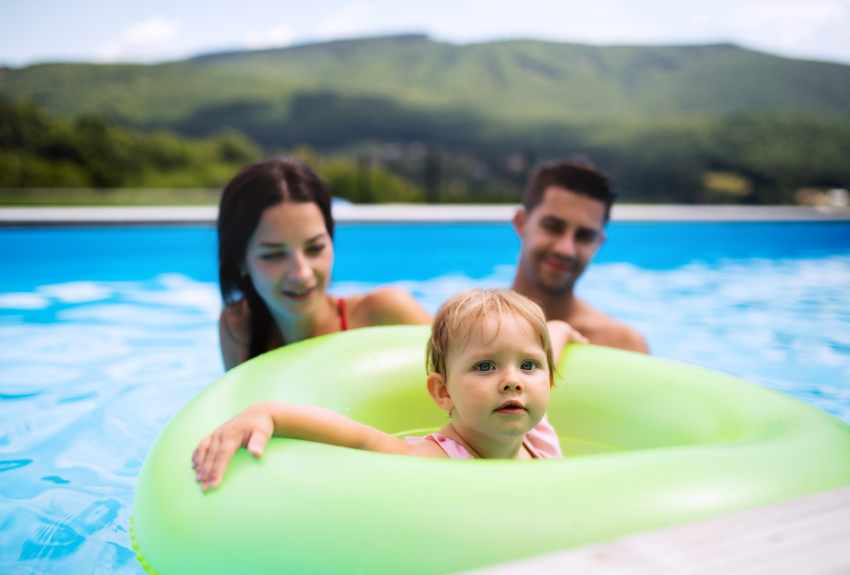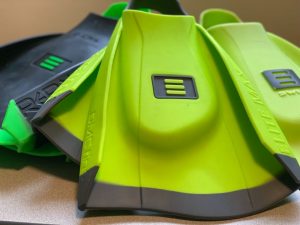
7 Best Swim Snorkels for Better Technique and Faster Swimming
Ready to throw down on a new swimmer’s snorkel? Here are reviews of the best swim snorkels for lap swimming.

Wondering how to heat an above-ground pool? Here are some proven ways to keep the water warm and comfy without breaking the bank.
Heating your swim pool is a quick and simple way to extend the use of your pool.
Those chilly morning swims aren’t so chilly anymore, cloudy day swims don’t include goosebumps, and you can splash around past sunset without getting a strong case of the shivers.
Heating your pool can also extend the swim season, adding days or weeks of added swimming to your pool season.
That said, heating your above-ground pool can be costly, especially if you aren’t making the most of the heat you are putting into the pool and protecting your pool from the elements.
Here’s a quick look at the three things you can do to heat your above-ground pool and enjoy your pool longer this year.
Let’s jump right in.
The fastest and best way to heat up an above-ground pool is with a standalone pool heater.
Pool heaters come in a few different shapes and forms, but the task is essentially the same whichever one you choose: cycle water through a pump or collector, warm it up, and send it back to the pool.
There are three main types of pool heaters for above-ground pools: gas (propane or natural gas), heat pumps (electricity), and solar.
There are advantages and disadvantages of each, and the one you choose will ultimately come down to your climate, energy requirements, size of your pool, and how much sun you get on the daily.
Heat pumps require the least upfront effort to install. They are attached to your pool’s plumbing and plugged in to a power source. That’s basically it. They function best when the air is on the warmer side, so if the weather regularly drops 45-50-degrees you will want to look elsewhere.
Gas heaters tap the same energy as your barbecue—propane or natural gas—to get your pool water to a comfortable temperature. Obviously, this requires a gas line, but this form of heating is fast, reliable, and depending on where you live, very affordable.
Lastly, we have Mr. Renewables, the solar-powered pool heater. They vary widely on price (mainly comes down to how large your pool is and how cold it gets and how many panels you need) but they can pay for themselves within a couple of years.
The only downside is that they require a steady amount of sunshine in order to generate enough energy to warm the pool water.
The heater you choose to keep your above-ground pool warm is ultimately up to you, and there is no perfect solution, just what’s ideal for you and your backyard pool.
For most people, a pool cover is a glorified tarp. A bunch of crinkled nylon that lifelessly sits across the surface of the water.
But for smart pool owners who want to keep the heat in their above-ground pool, they know what’s actually under the hood: a cost-saving, energy bill-slashing, heat-retaining machine.
Solar pool covers are far and away the best thing you can do to keep your above-ground pool water nice and heated.
Even though the days of summer are hot, the UV rays unrelenting, the heat quickly begins to dissipate and drift back into the atmosphere when the sun sets and the mercury drops.
Solar covers trap all the heat in the pool so that you can wake up tomorrow with a pool that isn’t a bucket of icicles and goosebumps.
In fact, they are so effective that they can retain up to 95% of the heat in your pool overnight.
The energy savings over the long run is eye-popping.
A pool owner in Miami, for instance, using a heat pump to warm his pool would save about $2,000 a year in energy costs by covering the pool1.
Not to mention saving the frustration of having to wait for the pool to become a warm temperature again after a chilly, uncovered night.
Solar covers won’t heat your above ground pool, but they will keep you from having to keep your pool heater chugging non-stop to re-warm it.
The elements are always trying to get at your pool.
Whether it’s dumping copious amounts of rainfall into the pool, diluting the water and throwing off the pool chemistry, dropping twigs, leaves and other organic debris into the pool and creating cloudy pool water, or literally blowing the heat off the surface of the pool, Mother Nature will decide.
Although we tend to imagine that pool water gets cool because of the ambient air (it does), wind also plays a significant role in sending the temperature crashing to the pool floor.
Similar to your trusty solar cover, blocking the wind from gusting past your uncovered pool can significantly reduce heat loss and water evaporation.
The wind expands the amount of surface area at the top of the pool, speeding up evaporation and accelerating heat loss.
(The wind also carries off your pool chemicals too, which means your water chemistry will be affected.)
While boxing out the wind completely is unlikely (unless you plan on throwing an enclosure around it), setting up a wind shield in the form of more shrubbery or even just placing your pool smartly in a place where it won’t get a case of the blusters can dramatically reduce heat loss.
In sum: heat the pool and keep the heat in.
7 Best Accessories for Above Ground Swim Pools. Looking to make your backyard pool even more fun? Check out this guide to some great ways to crank up the good times.
5 Best Pool Thermometers. The right pool thermometer helps keep your pool running properly and comfortably. Here’s a breakdown of the best ones on the market for backyard pools and hot tubs.
Subscribe to the YourSwimLog.com newsletter and get tips and advice on how to swim faster every weekday morning, straight to your inbox.
Join 33,000+ swimmers, coaches, and swim parents learning what it takes to swim like a boss.
Unsubscribe anytime. Email will never be shared or sold.

Olivier Poirier-Leroy Olivier Poirier-Leroy is the founder of YourSwimLog.com. He is an author, former national level swimmer, two-time Olympic Trials qualifier, and swim coach.

Ready to throw down on a new swimmer’s snorkel? Here are reviews of the best swim snorkels for lap swimming.

Looking to get some new swim gear on a budget? Shop the best Black Friday deals for swimmers in this exclusive guide.

Looking for the best swimming app to maximize your time and effort in the water? Here’s a look at the top swim apps for conquering your swim workouts.

Wondering how often you should be testing the water in your pool or spa? Here’s a detailed look at how frequently you should test your pool. Your swimming pool and spa relies on being properly balanced to keep the water clean and safe for swimming. As a pool owner, you

Fed up with the effects and smell of chlorine in your hair after swimming? Here is how to remove chlorine from your hair once and for all.

The DMC Elite fins are high-performance training fins for competitive swimmers. Here’s a review of why these fins are flat-out awesome.

LANE 6 PUBLISHING © 2012-2024 · PRIVACY POLICY · RETURN POLICY · TERMS OF SERVICE · AFFILIATE DISCLOSURE